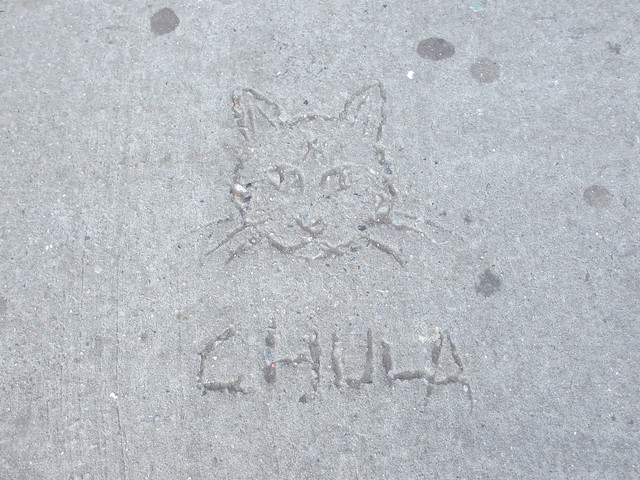
My friend Jan found my cat’s tag sign on the Lower East Side of Manhattan – that cat gets around!
I know I’ve been avoiding talking about the Trayvon Martin murder in depth. The event was tragic, terrible, and I feel for the all the families of the victim. The amount of videos, press information, and criminal reports I’ve read about the event is staggering compared to how I usually follow events like these. I’m hoping an arrest is made and criminal charges are pressed on Zimmerman and I’m appalled at the blatant racism that has been displayed by many, many people. It’s a reminder, to me at least, of how far this country has yet to go in regards to racial acceptance.
Bishop Hanson’s message was right on target, I think, and I’ve heard that Martin’s death has been on the radar of faithful Christians all over the place. It’s discussion has caused some soul searching, empathy, and it seems to be in the air even if its impact might be minimal in some places. But I would like to share one suggestion to those in the church who would like to discuss this attack (and racial issues) in general: please don’t use the word “become” as in “what has our society become that allows this to happen?” Speaking for myself, that phrase just shuts me down. In that one simple word and thought, what I see is a romanticism of the past, a rejection of all the other cases of racial violence/discrimination that have happened over the years, and a misidentification of the fact that race in the United States is still a big deal. Discrimination is still a big deal. We, collectively, are not moving away from some golden age but, rather, we’re suppose to be on track towards something better. The amazing thing is not that such an event happened but, rather, that there has existed, and continues to exist, a systematic structure in our society’s very being that allows such a thing to happen. If you are speaking of the law and searching for the gospel, if you are trying to tell the church how the world truly is, focusing on that one act isn’t enough. The groundwork that led to such an event is bigger than that and is built into our very bones. That’s sin and that needs to be talked about, and not washed away under some assumed golden age that was in our recent past.
Today’s reading in the lectionary for Holy Week is John 12:1-11. “You always have the poor with you, but you do not always have me” Jesus said to the disciples after they complained about Mary’s anointing of Jesus’ feet. I’ll admit I’ve always struggled with what Jesus said. Even when I exegete it, contextualize the story, and reframe the discussion to argue that what Jesus is commenting on is the lack of faithfulness that the disciples have, I still always return to that phrase “you will always have the poor with you” and shudder. It’s always struck me as an un-hopeful phrase. We will always have the poor with us? Really? We’ll always have the rejected, the unwanted, those who we don’t want to belong? We’ll always have people that we will not invite to our table but that only Jesus will? Always? For all time? Sheesh. What kind of Messiah are you, then? Can’t you just go ahead and take care of it all, wipe the poverty, injustice, fear, from the world, and end the very idea of the poor? I know that the Old Testament told us to let the poor glean but you just marched into Jerusalem with palms and garments thrown on your path – can’t you do MORE?
Today, for me at least, what Jesus tells the disciples is how I’ll frame what the church needs to say about racial injustice in this country. Don’t romanticize the past and claim that the “poor” were never there. Don’t, also, claim that this will be a topic that we’ll ever NOT have to talk about. We don’t, really, live in a post-racial society. We don’t live in a post-class society. We don’t live in a post-gender society. We don’t live in a post-sexuality society. As a church, we need to be honest and keep describing how the world truly is. The world needs to be broken into, changed, and made right. And as we march through this Holy Week, towards the Cross, lets try to keep all of this in mind. We’re not re-enacting the passion story – we’re proclaiming it because it is still needed to be heard today.